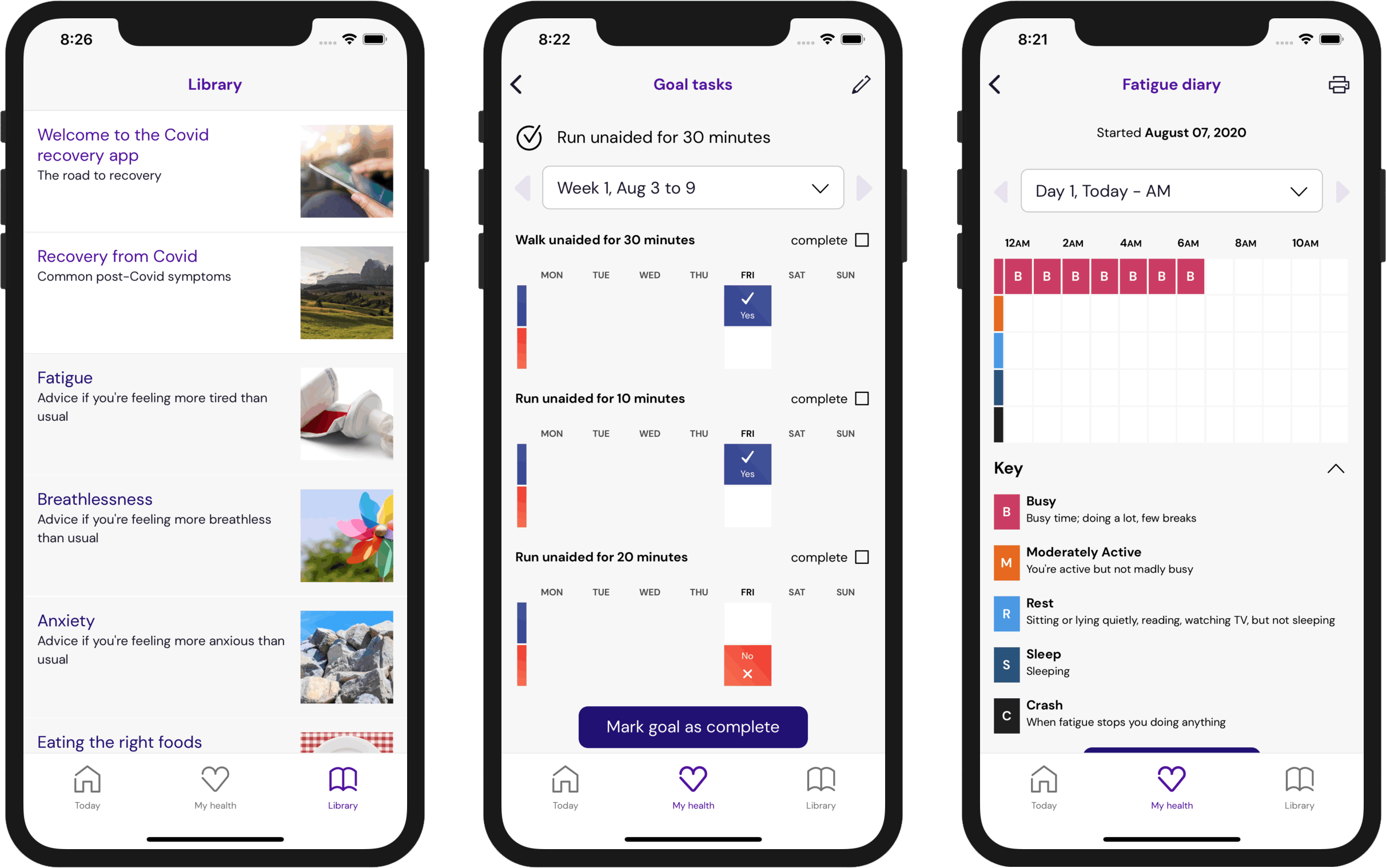A digital programme to treat the lasting symptoms of COVID19 has been developed by UCL researchers in collaboration with clinicians from Barts Health NHS Trust and UCL Partners. It has launched across Barts Health NHS Trust, the first such tool to begin use with patients.
Over 300,000 people have been infected by COVID19 in the UK. For many of those that survive however, this is only the start of their journey to recovery. There are increasing reports of COVID19 survivors still suffering from debilitating symptoms of tiredness, breathlessness and anxiety many weeks and months after the peak of their infection – a group often known as the COVID19 ‘long-haulers’.
Hospitals are limiting bringing patients in for face-to-face appointments to stop further spread of infection. Instead, many appointments are now carried out virtually and a team led by UCL health researchers and computer scientists, working with app developers Living With, have developed a rehabilitation tool that can be delivered completely remotely.
Launched last week, the tool combines evidence-based methods from physiotherapists, psychologists, dieticians and respiratory physicians to create bespoke treatment plans for each patient.
Project lead Prof Elizabeth Murray (Clinical Deputy Director, UCL Institute of Healthcare Engineering) said: “The uniqueness of this tool is that the whole treatment programme is delivered digitally, with remote support from clinicians. This benefits patients unable to come into the clinic, but it also allows us to help a far greater number of people in a cost-effective and time-effective way.”
Respiratory physician Dr Paul Pfeffer (St Bartholomew’s Hospital, part of Barts Health NHS Trust, and QMUL) commented: “The proportion of people needing further help is really high. We’re finding that half of the patients we discharge from hospital, are still experiencing significant symptoms after three months.”
“There are simply not enough staff and resources to reach everyone recovering from COVID-19 who are in need of using traditional models of care, such as face-to-face appointments. This tool allows us to provide high-quality treatment to large numbers of patients simultaneously.”
The rehabilitation tool targets three primary on-going symptoms being reported – fatigue, anxiety and breathing problems. The app is in use at Barts Health hospitals, with plans to roll out to UCL Partner hospitals in the near future. It is an additional aid that complements the existing rehab pathway, those patients who do not have access to a smart device will continue to receive traditional printed rehab plans and follow-up.
Psychologist Dr Stuart Linke (UCL Primary Care and Population Health and Camden and Islington Mental Health NHS Trust), said “The mental health component of the digital tool is just as important as the physical, and we are finding that the symptoms are often interrelated – for instance, if you’re feeling anxious you may be less likely to eat well, which may lead to further tiredness, which further impacts your mood and so on. A core feature of the recovery tool is Cognitive Behavioural Therapy (CBT) delivered by psychologists to help with anxiety.”
Physiotherapist Hannah Hylton (St Bartholomew’s Hospital), said “Issues that arise post-COVID are multi-factoral and often debilitating. For each person we are able to take a holistic approach to their treatment and provide a personalised plan via the tool, including frequent monitoring and ongoing communication.”
The programme includes an app for patients providing tailored advice, treatment plans and suggested exercises, and also supports clinicians with a dashboard to review patient progress and communicate, and a clinical pathway for how to provide safe, remote support. The digital tool has been developed by Living With, a digital health company that already delivers a range of remote management products for the NHS.
Chris Robson, CEO of Living With, commented “We have packaged up life-changing clinical input into an app and are providing it to patients through our existing remote condition management platform, to help them recover safely and comfortably from home. This launch with Barts is only the first step in turning the product into a smarter AI driven intervention that will be rolled out more widely across the UK.”
The product is an interdisciplinary collaboration between a range of clinicians, (respiratory specialists, physiotherapists, dieticians, psychologists, GPs), computer scientists and health researchers from UCL, Barts Health NHS Trust, University College London Hospital, University of Southampton, University of Exeter and Living With.
About UCL – London’s Global University
UCL is a diverse community with the freedom to challenge and think differently.
Our community of more than 41,500 students from 150 countries and over 12,500 staff pursues academic excellence, breaks boundaries and makes a positive impact on real world problems.
We are consistently ranked among the top 10 universities in the world and are one of only a handful of institutions rated as having the strongest academic reputation and the broadest research impact.
We have a progressive and integrated approach to our teaching and research – championing innovation, creativity and cross-disciplinary working. We teach our students how to think, not what to think, and see them as partners, collaborators and contributors.
For almost 200 years, we are proud to have opened higher education to students from a wide range of backgrounds and to change the way we create and share knowledge.
We were the first in England to welcome women to university education and that courageous attitude and disruptive spirit is still alive today. We are UCL.
www.ucl.ac.uk| Follow @uclnews on Twitter | Watch our YouTube channel | Listen to UCL podcasts on SoundCloud | Find out what’s on at UCL Minds | #MadeAtUCL
Find out how UCL is helping lead the global fight against COVID-19 at www.ucl.ac.uk/covid-19-research.
About Barts NHS Health Trust
With a turnover of £1.5 billion and a workforce of around 17,000, Barts Health is a leading healthcare provider in Britain and one of the largest NHS trusts in the country. The Trust’s five hospitals – St Bartholomew’s Hospital in the City, including the Barts Heart Centre, The Royal London Hospital in Whitechapel, Newham University Hospital in Plaistow, Whipps Cross University Hospital in Leytonstone and Mile End Hospital – deliver high quality compassionate care to the 2.5 million people of east London and beyond.
About Living With
Living With is an award-winning digital health company, with a remote condition management platform, that can be configured to manage any patient with any condition. Patients get personalised apps to help them understand and track their condition. A clinician portal enables clinicians to monitor patients and support remote interventions.
Living With owns Squeezy, the NHS endorsed, UK’s top paid medical app, and currently has 9 further products in 18 NHS Trusts across England, Wales and Northern Ireland; including Living With Pelvic Health, Living With Overactive Bladder, Living With Faecal Incontinence, Living With Constipation, Living With Pregnancy Pain, Living With Rheumatoid Arthritis and Living With Oesophageal Cancer. There are four further products in development.


